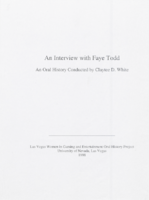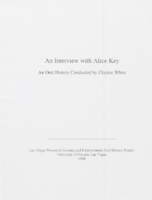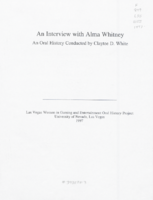Search the Special Collections and Archives Portal
Search Results

Transcript of interview with Faye Todd by Claytee D. White, October 15, 1996
Date
Archival Collection
Description
Interview with Faye Todd conducted by Claytee D. White on October 15, 1996. Featured in Ebony Magazine in 1979, Todd achieved executive status in the Las Vegas gaming industry, serving as Special Events Coordinator for Desert Inn Hotel and Casino and Entertainment Director/Corporate Executive Assistant for Landmark Hotel and Casino.
Text

Transcript of interview with Sarann Knight by Yvonne Hunter, July 16, 1975
Date
Archival Collection
Description
Interview with Sarann Knight [Preddy] conducted by Yvonne Hunter on July 16, 1975. Preddy moved to Hawthorne, Nevada, in the 1940s, becoming a business owner and president of the NAACP. Later she moved to Las Vegas, where she served as a community activist and worked as one of the first black 21-dealers.
Text

Transcript of interview with D. D. Cotton by Claytee D. White, February 14, 1997
Date
Archival Collection
Description
Interview with D. D. Cotton conducted by Claytee D. White on February 14, 1997. Raised in New York City, Cotton arrived in Las Vegas as a dancer in Cab Calloway's traveling production "The Cotton Club." During a period of strained race relations, she stood for equal rights as the first black cocktail waitress on the Strip and one of the first black dealers.
Text

Transcript of interview with Alice Key by Claytee D. White, February 17, 1997
Date
Archival Collection
Description
Interview with Alice Key conducted by Claytee D. White on February 17, 1997. Dancer, writer, and community activist, Key served as Deputy Labor Commissioner for the State of Nevada and leader of the NAACP in Las Vegas. As a newspaper reporter, she exposed the separation of blood plasma according to race in World War II. With Bob Bailey, Key created the first all-black television show in the nation and a radio program, interviewing black entertainers in a talk-show format.
Text

Transcript of interview with Vicki Richardson by Claytee D. White, August 19, 2003
Date
Archival Collection
Description
Interview with Vicki Richardson conducted by Claytee D. White on August 19, 2003. As a high school junior in Wilmington, Delaware, Richardson was one of twelve African American students chosen to integrate the school system. A civil rights activist in high school and college, Richardson wrote letters to local newspapers and engaged in protests to desegregate public spaces. Inspired by Harlem Renaissance painters, Richardson paid her way through college by teaching art at a recreation center. She went on to Vanderbilt University and later the University of Chicago where she had a Ford Foundation Fellowship to study inner-city education. She taught at Forestville High School in Chicago where she was Chairwoman of the Art Department and later at Rancho High School in Las Vegas. Richardson owns Left of Center Art Gallery in North Las Vegas and several other local businesses.
Text

Transcript of interview with Anna Bailey by Claytee D. White, March 3, 1997
Date
Archival Collection
Description
Interview with Anna Bailey conducted by Claytee D. White on March 3, 1997. Arriving in Las Vegas in 1955 to perform as a dancer for the opening of the Moulin Rouge, Bailey also starred in traveling shows nationally and in Europe. Returning to Las Vegas, she became the first African American to dance in a house chorus line on the Strip. Later she became one of the first black women in Nevada to hold a gaming license, owning and operating several small nightclubs.
Text

Transcript of interview with Alma Whitney by Claytee D. White, March 3, 1996
Date
Archival Collection
Description
Interview with Alma Whitney conducted by Claytee D. White on March 3, 1996. Seeking better employment opportunities, Whitney moved to Las Vegas from Tallulah, Louisiana, at the age of sixteen. Whitney supported Westside churches and schools and was respected as supervisor in housekeeping at Desert Inn. Whitney provides information on the African American migration to Las Vegas during the 1940s, post-war race relations in Las Vegas, the daily work of hotel maids, and the Culinary Union.
Text

Transcript of interview with Lucille Bryant by Claytee D. White, December 13, 1995
Date
Archival Collection
Description
Interview with Lucille Bryant conducted by Claytee D. White on December 13, 1995. Moving to Las Vegas in 1953 from Tallulah, Louisiana, Bryant worked in the housekeeping departments of the Algiers Hotel, the Silver Slipper, the Sands, and the Stardust. Bryant provides an overview of pre-Civil Rights era conditions in Tallulah and Las Vegas including housing, schools, and working conditions as well as her experiences with the Culinary Workers Union Local 226.
Text

Transcript of interview with Jackie Brantley by Claytee D. White, October 27, 1996
Date
Archival Collection
Description
Interview with Jackie Brantley conducted by Claytee D. White on October 27, 1996. Born in Las Vegas following World War II, Brantley grew up on the Westside. Beginning as a public relations specialist for Desert Inn Hotel and Casino, Brantley later worked as a model and supported the development of Nucleus Business Plaza.
Text

Transcript of interview with Faye Duncan Daniel by Claytee D. White, October 18, 1996
Date
Archival Collection
Description
Interview with Faye Duncan Daniel conducted by Claytee D. White on October 18, 1996. Beginning in clerical work at the Nevada Test Site, Daniel rose to become the Assistant Hotel Manager at Union Plaza Hotel and Casino. She established the Hotel Managers Association and the Professional Black Women's Alliance. After leaving the gaming industry, Daniel returned to school to train for a career in education. She worked closely with the Displaced Homemaker Program at the Community College of Southern Nevada and later with Help Centers of Southern Nevada.
Text
